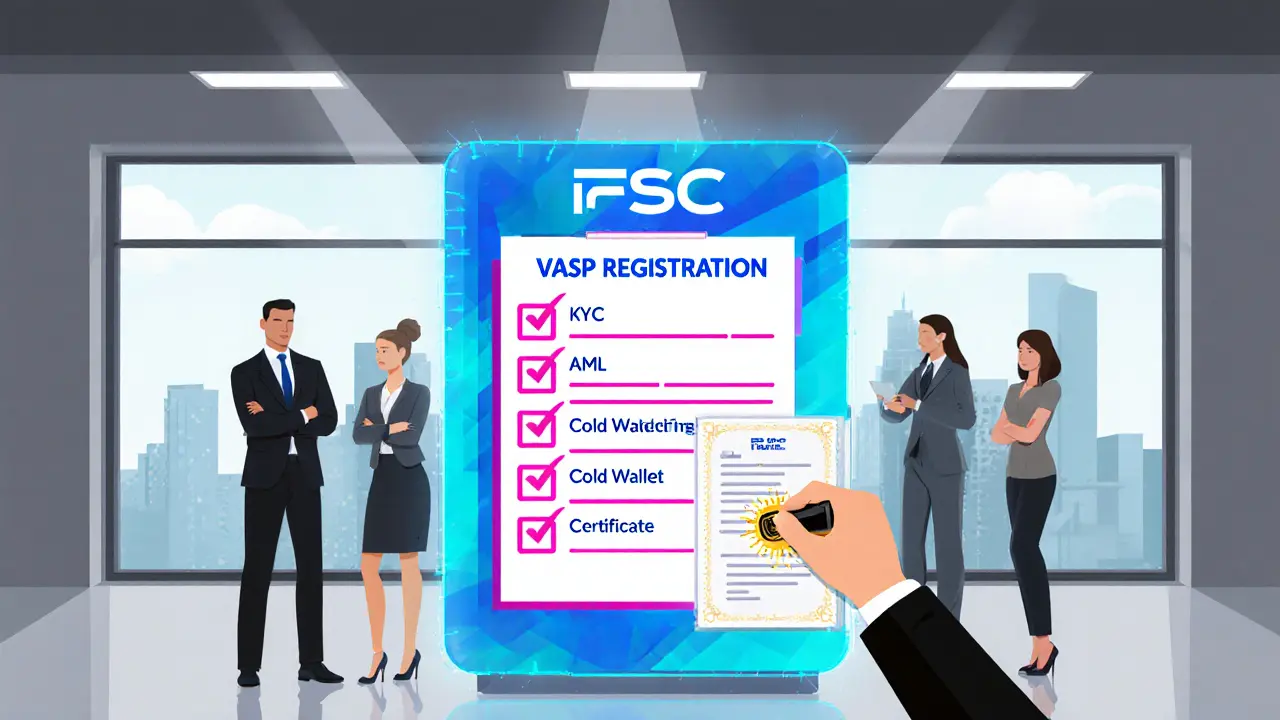Taiwan Crypto Regulation Impact Calculator
Taiwan has a strict regulatory framework for crypto. Key points:
- Banks cannot handle crypto transactions
- All VASPs must register starting Jan 2025
- Penalties for non-compliance include fines up to NT$5 million
- Stablecoins pegged to TWD will get a dedicated legal framework
Enter your profile details and click "Analyze Compliance Impact" to see how Taiwan's crypto regulations affect you.
- 2.3 million Taiwanese citizens own crypto
- Daily trading volume exceeds $200 million
- Over 23 VASPs have completed registration
- Stablecoin framework expected by June 2025
- CBDC pilot underway since late 2024
If you’ve been watching Taiwan’s crypto scene, you’ve probably heard the phrase “banking restrictions.” It isn’t a prank - the island’s regulators have deliberately kept traditional banks out of the digital‑asset business while letting other players operate under a strict registration regime. This article unpacks what that means for exchanges, users, and anyone eyeing the next wave of stablecoins or a central bank digital currency.
Key Takeaways
- Since 2014 the Financial Supervisory Commission (FSC), together with the Central Bank of the Republic of China (CBC), bans banks from handling Bitcoin and other crypto transactions.
- From 1January2025, all Virtual Asset Service Providers (VASPs) must register for AML compliance, or face fines up to NT$5million and possible imprisonment.
- MaiCoin remains Taiwan’s biggest exchange, moving roughly $70million daily, but it still can’t tap local bank accounts for fiat‑crypto flows.
- Stablecoins pegged to the New Taiwan Dollar will get a dedicated legal framework in mid‑2025, opening a narrow door for regulated banks.
- A CBDC pilot is already under way, hinting at a future where the government‑backed digital token may sit beside, but not replace, the current prohibitions on speculative crypto.
Regulatory Foundations: From “Virtual Commodity” to Full‑Blown Framework
On 30December2013 the FSC issued its first position paper, classifying Bitcoin as a “highly speculative virtual commodity” rather than legal tender. That label still matters - it keeps crypto out of the traditional money definition that the Central Bank supervises. Over the next decade the FSC and CBC built a layered system:
- 2014 - explicit ban on banks accepting Bitcoin or offering fiat‑crypto exchange services.
- 2020 - security tokens brought under the Securities and Exchange Act.
- 2021 - voluntary AML guidelines for VASPs (later made mandatory).
- 2022 - FSC instructs the bankers’ association to stop credit‑card processing for crypto purchases, treating it like online gambling.
- 2024‑2025 - mandatory VASP registration, fines, and criminal penalties introduced.
These steps show a pattern: keep the speculative market alive, but cordon it off from the regulated banking system.
Banking Prohibitions and Their Real‑World Reach
When the FSC says “no banks may handle crypto,” it means three concrete things:
- No deposit accounts for crypto exchanges. A Taiwanese bank will refuse to open a business account for MaiCoin or any other VASP.
- No credit‑card gateway for buying digital assets. Consumers can’t use a Visa or Mastercard issued by a local bank to purchase Bitcoin on a domestic platform.
- No fiat‑to‑crypto settlement via traditional interbank transfers. Users must rely on third‑party processors, P2P trades, or cash deposits.
In practice, the restrictions push users toward workarounds. Reddit threads from r/Taiwan show a surge in peer‑to‑peer (P2P) platforms like LocalBitcoins, where sellers accept cash or mobile payment apps that are not classified as “bank services.” International exchanges that have secured a VASP licence (e.g., Binance Taiwan) accept e‑wallet transfers from users who first fund a local e‑money account.
VASPs Registration Regime: What It Takes to Get Approved
Starting 1January2025, any entity that wants to provide wallet, exchange, or custodial services in Taiwan must register as a VASP. The process is spelled out in the FSC’s AML guideline and includes:
- Submission of a detailed compliance manual covering Know‑Your‑Customer (KYC), transaction monitoring, and reporting procedures.
- Proof of asset segregation - crypto holdings must be stored in cold wallets that are separate from operational funds.
- Cybersecurity audit by an approved third‑party firm, focusing on multi‑factor authentication and intrusion detection.
- Annual filing of transaction reports exceeding NT$2million (≈ US$62,000).
Failure to register triggers a fine of up to NT$5million and, in severe cases, up to two years in prison. By late 2024, 23 VASPs had completed the registration, with MaiCoin commanding roughly 35% of daily trading volume.
Setting up a new VASP is not cheap. Industry surveys report a 3‑6month learning curve and compliance spend ranging from NT$2million to NT$5million, covering legal counsel, AML software, and security audits. The Taiwan Virtual Asset Service Provider Association, formed in June2024, now offers a shared compliance toolbox that cuts costs for newcomers.

Impact on Exchanges, Users, and the Wider Market
For exchanges, the ban on bank accounts means payroll, vendor payments, and even tax filings often rely on overseas accounts or cash‑based services. MaiCoin’s 2023 announcement to list on the local bourse highlighted the difficulty - the company had to set up a holding company in Singapore to manage its fiat side.
Users feel the pinch too. Review sites give MaiCoin an average rating of 3.8/5, with comments pointing to “no direct bank transfer” as a major inconvenience. International platforms that have obtained a VASP licence score higher (average 4.2/5) because they support a broader range of payment processors.
Despite these hurdles, adoption remains strong. The FSC estimates that 2.3million Taiwanese citizens own crypto, roughly 10% of the population. Daily trading volume across all registered platforms reaches about $200million, and year‑over‑year user growth sits at 15%.
Stablecoin Framework: A Narrow Door Opens for Banks
June2025 will bring a draft law specifically governing stablecoins pegged to the New Taiwan Dollar (TWD). Unlike unregulated USDC or USDT, these “government‑backed” stablecoins can be issued by licensed financial institutions under strict oversight.
Key provisions include:
- Mandatory reserve ratio of 100% - every stablecoin must be fully backed by TWD held in a central bank‑approved account.
- Real‑time audit reporting to the FSC.
- Permitted use of local bank clearing channels for stablecoin‑to‑fiat settlement.
While the law does not lift the blanket ban on banks handling speculative crypto, it creates a sandbox where banks can partner with vetted issuers. This could lead to new products like “stablecoin‑linked savings accounts” or “instant cross‑border remittances” that bypass the current P2P bottleneck.
CBDC Pilot and Future Outlook
In December2023 the CBC completed a feasibility study for a Central Bank Digital Currency (CBDC). Prototype testing began in late2024, using the existing digital voucher infrastructure. The CBDC will be a sovereign token, fully regulated, and settled on a permissioned ledger.
How will the CBDC interact with the existing crypto regime?
- It is expected to be **separate** from speculative assets - the banking ban will likely stay for Bitcoin, Ethereum, and similar tokens.
- Stablecoins approved under the new law could interoperate with the CBDC, offering a bridge between private digital assets and the state‑issued token.
- Successful CBDC rollout may prompt the FSC to relax credit‑card restrictions for government‑backed digital payments, but only within the narrow scope of the CBDC.
Analysts at PwC Taiwan see this as a “controlled opening” - the government wants innovation, just not at the expense of financial stability.
Comparison with Other Asian Jurisdictions
| Aspect | Taiwan | Singapore | Japan |
|---|---|---|---|
| Banking involvement | Prohibited for speculative crypto | Allowed under MAS licensing (crypto‑friendly) | Limited; banks can offer custodial services |
| VASPs registration | Mandatory (2025), heavy AML | Mandatory (PSP licence), moderate AML | Mandatory (FIEA), strict reporting |
| Stablecoin framework | Pending 2025 law, bank‑issued only | Existing Payment Services Act covers stablecoins | Regulated as “virtual currency” under FIEA |
| CBDC status | Prototype testing 2024‑25 | Exploratory pilots (e‑MyCash) | Research phase, no pilot yet |
The table shows Taiwan’s approach is the most restrictive when it comes to banking integration, but its clear VASP registration path gives businesses a predictable compliance road‑map.
Practical Tips for Users and Start‑ups in Taiwan
Whether you’re a retail trader or a new crypto start‑up, here are some actionable steps:
- Choose a registered VASP. Look for the FSC‑approved list - it guarantees you’re covered by AML rules.
- Use P2P platforms or international e‑wallets to fund your crypto purchases. Services like LINE Pay or local e‑money operators often bridge the gap.
- If you’re launching a VASP, budget at least NT$3million for compliance and cybersecurity audits. Leverage the industry association’s shared resources to cut costs.
- Monitor the stablecoin draft law. Early‑stage partnerships with banks could give you a first‑mover advantage once the framework is final.
- Stay updated on the CBDC pilot. When the central bank opens a sandbox, joining could provide access to wholesale settlement channels.
Following these steps helps you stay on the right side of the law while still taking advantage of Taiwan’s active crypto community.

Frequently Asked Questions
Can I use a Taiwanese bank to buy Bitcoin?
No. The FSC’s 2014 directive bars all local banks from accepting Bitcoin or facilitating fiat‑to‑crypto conversions. You’ll need a registered VASP or a P2P platform to purchase crypto.
What penalties do VASPs face for operating without registration?
Unregistered VASPs can be fined up to NT$5million and may face criminal charges that carry up to two years of imprisonment, according to the FSC’s 2024 enforcement rules.
Will stablecoins ever be allowed through Taiwanese banks?
Yes. The upcoming 2025 stablecoin law explicitly permits licensed financial institutions to issue and settle government‑backed stablecoins, opening a narrow channel for bank involvement.
How does the CBDC pilot affect regular crypto users?
The CBDC is a separate, state‑issued token. It won’t replace Bitcoin or Ethereum, but it may introduce new payment options that coexist with existing crypto services.
What’s the best way to fund a VASP account without a bank?
Most VASPs accept cash deposits via convenience‑store partners, or e‑wallet top‑ups from services like LINE Pay. These methods skirt the banking ban while staying compliant.


7 Responses
This is wild 🤯 Taiwan’s basically playing chess while everyone else is playing checkers. No bank access but still $200M daily volume? That’s insane. P2P is the real MVP here. I’d love to see how they handle tax reporting with cash deposits lol.
The regulatory framework outlined here is remarkably structured. While the banking restrictions may appear restrictive, they reflect a deliberate strategy to isolate speculative risk from the core financial system. The upcoming stablecoin legislation represents a thoughtful compromise, enabling innovation within clearly defined guardrails. This approach deserves recognition as a model of prudent financial governance.
Why let foreigners run crypto in Taiwan at all? Banks should stay out of digital nonsense period. No CBDC either. Just ban it all. Full stop.
Okay let’s break this down because this is actually genius. 🚀 They didn’t try to kill crypto - they just built a fence around it. No bank access? Fine. But now VASPs have to be legit, audited, and compliant. That’s a win for users. And the stablecoin move? That’s not a loophole - it’s a bridge. Banks can finally play a role without touching Bitcoin. Smart. If you’re building in crypto right now, Taiwan’s giving you a clear playbook. Use the shared compliance tools. Get registered. Watch the CBDC pilot. This isn’t a wall - it’s a controlled launchpad.
Bro Taiwan is the real crypto OG 🤝 P2P cash deals and LINE Pay funding? That’s next level. I’ve done this in Delhi too but never thought it’d be legit here. MaiCoin’s doing the heavy lifting and the FSC is actually helping them? Respect. 10% of the population in crypto? That’s more than my whole city 😎
The regulatory clarity is commendable. The separation between speculative assets and institutional infrastructure is necessary. I do not engage with crypto myself, but the framework described appears logically consistent and minimizes systemic risk. No further comment.
I just... I don’t know. I mean, it’s confusing. Banks can’t touch crypto, but they can touch stablecoins? And the CBDC is separate? So... it’s like, crypto is illegal, but not illegal? And you can use LINE Pay? But not banks? I’m just trying to understand how anyone actually uses this. It’s... a lot. I’m not against it, I just wish it was simpler.